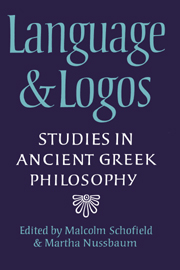Book contents
- Frontmatter
- Contents
- Preface
- Introduction
- 1 Heraclitus' conceptions of flux, fire and material persistence
- 2 Epistemology and meaning in Heraclitus
- 3 The dénouement of the Cratylus
- 4 Cratylus' theory of names and its refutation
- 5 Knowledge and language: the Theaetetus and the Cratylus
- 6 Falsehood and not-being in Plato's Sophist
- 7 Forms and dialectic in the second half of the Parmenides
- 8 Aristotle and the more accurate arguments
- 9 Aristotle on the principles of change in Physics I
- 10 Aristotle on natural teleology
- 11 Accidental unities
- 12 Aristotle's concept of signification
- 13 Saving Aristotle's appearances
- 14 Myths about non-propositional thought
- 15 Gods and heaps
- Bibliography of the publications of G. E. L. Owen
- Index locorum
- Index of names
1 - Heraclitus' conceptions of flux, fire and material persistence
Published online by Cambridge University Press: 09 October 2009
- Frontmatter
- Contents
- Preface
- Introduction
- 1 Heraclitus' conceptions of flux, fire and material persistence
- 2 Epistemology and meaning in Heraclitus
- 3 The dénouement of the Cratylus
- 4 Cratylus' theory of names and its refutation
- 5 Knowledge and language: the Theaetetus and the Cratylus
- 6 Falsehood and not-being in Plato's Sophist
- 7 Forms and dialectic in the second half of the Parmenides
- 8 Aristotle and the more accurate arguments
- 9 Aristotle on the principles of change in Physics I
- 10 Aristotle on natural teleology
- 11 Accidental unities
- 12 Aristotle's concept of signification
- 13 Saving Aristotle's appearances
- 14 Myths about non-propositional thought
- 15 Gods and heaps
- Bibliography of the publications of G. E. L. Owen
- Index locorum
- Index of names
Summary
Even when they are most worthy of amazement, things of daily occurrence pass us by unnoticed.
Seneca, Quaestiones Naturales 7.1.1It can be hardly be supposed that a false theory would explain in so satisfactory a manner as does the theory of natural selection the several large classes of fact above specified. It has recently been argued that this is an unsafe method of arguing; but it is a method used in judging of the common events of life and has often been used by the greatest natural philosophers.
Charles Darwin, Origin of SpeciesHeraclitus and the Milesians
In recent decades there has been a tendency among scholars to question whether Heraclitus was, in the same sense as the Milesians were, a cosmologist: ‘[Heraclitus'] real subject is not the physical world but the human condition, which for the Greeks means the condition of mortality … Like [his] substitution of Fire for [Anaximenes'] Air, any changes in detail must have been designed not to improve the physical scheme in a scientific sense but to render its symbolic function more drastic.’
It would be foolish to deny that problems about mortality, fallibility and the human perspective were an important part of Heraclitus' main subject. But this is not inconsistent with his having seen himself as answerable in the first instance to the same questions as the Milesians, whatever his reservations about their would-be polymathiē:
One thing is wisdom: to understand the plan by which all things are steered through all things (B41).
- Type
- Chapter
- Information
- Language and LogosStudies in Ancient Greek Philosophy Presented to G. E. L. Owen, pp. 1 - 32Publisher: Cambridge University PressPrint publication year: 1982
- 7
- Cited by



